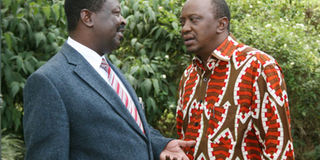President elect Uhuru, Mudavadi in post-election pact

President-elect Uhuru Kenyatta (right) confers with Musalia Mudavadi (left) at his Nairobi home March 16, 2013 moments after signing a post election agreement with nine parties. WILLIAM OERI
What you need to know:
- Nine parties and some independent candidates part of agreement making up majority in Senate and Parliament
Amani coalition presidential candidate Musalia Mudavadi on Saturday threw his weight behind President-elect Uhuru Kenyatta and his deputy William Ruto in a deal that will give the Jubilee coalition a majority in the Senate and Parliament.
A total of nine political parties and a number of independent candidates were involved in the agreement which was signed at the President-elect’s home in Nairobi.
Moments after the deal was sealed, an emboldened Mr Kenyatta announced that the Jubilee leadership was ready for a repeat election if the petition filed on Saturday by Cord coalition at the Supreme Court is successful.
“If the Supreme Court rules in our favour, we welcome our colleagues to join us so that we can move this country forward. But if they rule against us, then we are ready to go back to the people.”
Mr Mudavadi, who came a distant third after Mr Kenyatta and Raila Odinga of Cord, said his move was informed by his pre-election pledge to accept the decision that would be made by Kenyans.
“I want to congratulate you for a deserved victory,” said Mr Mudavadi. “We want to work with you; we do not want to create an unnecessary stumbling block as we move ahead.”
Mr Ruto praised the partnership as one that puts Kenyans’ interests before those of the leaders. “We have a national agenda that goes beyond any region, party, religion or creed,” he said. “You have come to add impetus to that agenda.”
Last year, Mr Mudavadi joined the Jubilee leaders after a deal was sealed on December 4, the last day of forming pre-election coalitions. Mr Mudavadi was to be the flagbearer and Mr Ruto his running mate. Mr Kenyatta was poised to be compensated by getting the lion’s share of government positions for his “sacrifice”.
However, the agreement broke down a few days later with Mr Kenyatta claiming that some “dark forces” had coerced him into the agreement.
“Yes, I signed the agreement after being compelled to do so by dark forces who claimed that a Kikuyu can’t be elected and that foreigners will suspend aid to Kenya,” he said.
A bitter exchange followed with Mr Mudavadi’s side demanding that the coalition drop the name Jubilee, saying it was their brainchild.
However, a truce was later called with Mr Mudavadi forming a coalition with Kanu, naming it Amani.
Strong message
Mr Kenyatta on Saturday said Mr Mudavadi’s move sends a strong message that leaders could work together after competing in elections.
But the move will keep political analysts busy in the coming days. From the word go, some saw Mr Mudavadi’s bid as a strategic move by the Jubilee coalition to split the Luhya vote, which was considered a stronghold of Mr Odinga.
In Kakamega County, for instance, Mr Mudavadi bagged 144,962 votes against Mr Odinga’s 303,120, while in Vihiga, the former polled 82,426 votes against the PM’s 77,826. In Bungoma County, Mr Mudavadi scored 107,868 votes against Mr Odinga’s 185,419.
The region overwhelmingly voted for Mr Odinga during the 2007 General Election.
In addition to Mr Mudavadi’s United Democratic Forum, other political parties at Saturday’s parley were the Alliance Party of Kenya (APK), Kanu, Ford People, New Ford Kenya, Kaddu Asili, Peoples Democratic Party (PDP), Muungano and Chama Cha Uzalendo (CCU).
The event was attended by Kiraitu Murungi of APK, Eugene Wamalwa of New Ford Kenya and Wavinya Ndeti of CCU, Omingo Magara of PDP and Henry Obwocha of Ford People. Kanu’s Gideon Moi left Mr Kenyatta’s home before the signing ceremony began.
Mr Wamalwa said: “I’m glad that we didn’t take the battle to the streets.”
But Mr Murungi told Mr Kenyatta not to worry about the petition. “In the legal profession, we look for the evidence, analyse it, then decide whether or not to go to court,” he explained. “But they decided to go to court, then started to look for the evidence.”
Mr Ruto said they are willing to join hands with Cord leaders once the court proceedings have been determined.




